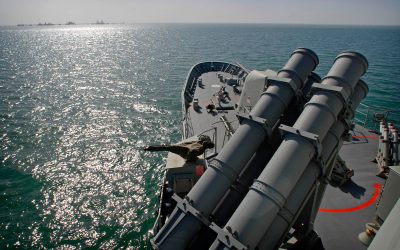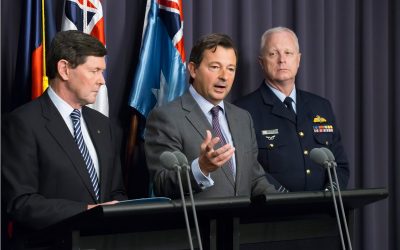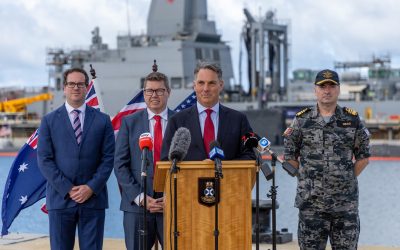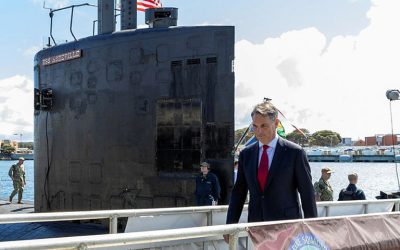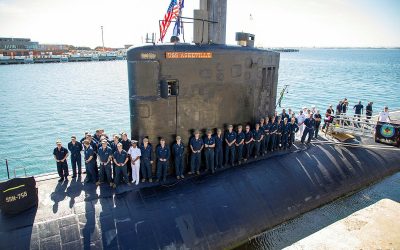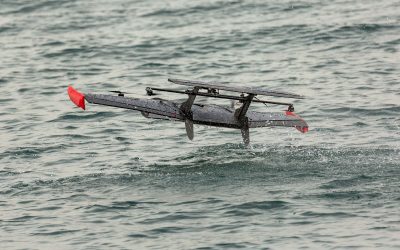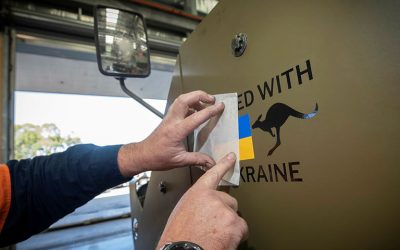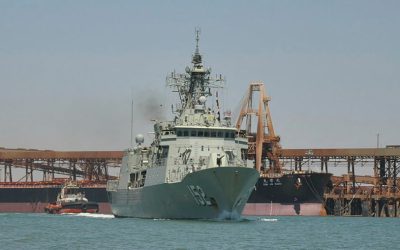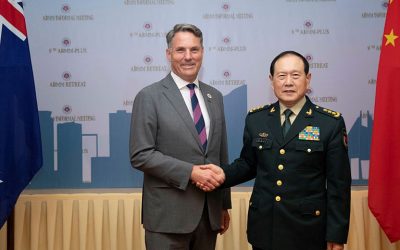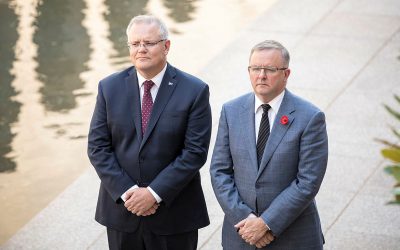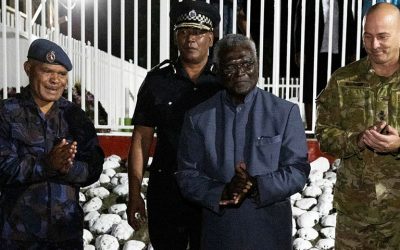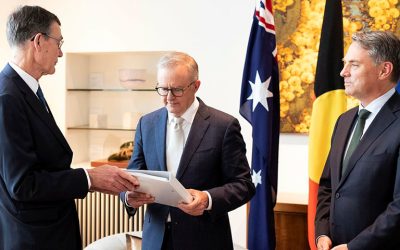ARTICLES
The unclassified Defence Strategic Review: a shortened ambition?
Rapidly shifting contexts drive tough decisions. For Australia, that context is a more entitled China, a disrupted, multipolar environment driven by technological competition, and with the conflict in Europe, a possible return to an age of blood and iron—and...
What we’ve learned from the Defence Strategic Review
While there’s only a single paragraph devoted to it down on page 23, it’s clear that the Defence Strategic Review and the billions of dollars the government will spend on Defence over the next ten years is all about grappling with Chinese power in the Indo Pacific....
Saltwater Strategists Podcast: AUKUS, DSR and Australia’s Maritime Capability
In this Australian Naval Institute Saltwater Strategists podcast, Dr Marcus Hellyer, Head of Research at Strategic Analysis Australia, examines many of the key issues around maritime capability and the Defence Strategic Review. In a wide-ranging discussion Marcus...
Unpacking the cost of our nuclear-powered submarine program
The government has said that the cost of buying and operating our eight nuclear-powered submarines (SSNs) will be between $268 billion and $368 billion ‘over the life of the program’. But what does that staggeringly large number mean? The government has suggested we...
AUKUS pillar two needs more than Defence
Amidst recent speculation over the Defence Strategic Review and budget funding, it’s far from clear the promises of AUKUS are to be met. While pillar one of AUKUS, the nuclear-powered submarines, has garnered most attention, it is AUKUS pillar two that’s more...
Critics and cheerleading aside, Albanese’s defence strategy has Australia in good company
The first big national security decision prime minister Albanese has taken is on how Australia will work with the US and UK to build and operate 8 nuclear submarines. That’s a huge decision with long term commitments, challenges and expense. But it’s by no means the...
Strategic Review must be more than catalogue shopping and internal cuts
There’s a hole in the middle of the discussion about defence, AUKUS and nuclear submarines. And that hole is what will be done to deter conflict involving China between now and 2030. The good news is the hole can be filled and the Albanese government’s decisions on...
Defence should hand over David Peever Review for AUKUS or fail on ambitions
The media headlines were all about submarines but innovation will be the productive core of the AUKUS agreement. This presents a huge stretch target for Defence and industry. Standing with US President Joe Biden and British Prime Minister Rishi Sunak in San Diego,...
Taiwan: four big reasons it matters to Australians
Taiwanese President Tsai Ing-wen is meeting with US House Speaker McCarthy before travelling on to Latin America, and European states like the Czech Republic, Lithuania and the United Kingdom are continuing to deepen political engagement with Taiwan. At the same time,...
It’s time to return fire against AUKUS naysayers
The AUKUS pathway for Australia’s nuclear-powered submarines is barely 10 days old. Already it is clear that the biggest threat to the plan is not the opposition, which is embracing bipartisan support, or China’s absurd attempts to distract from its own military...
Twelve steps towards delivering a successful defence program
Given the world’s tough economic outlook and the eroding geo-strategic situation, Anthony Albanese may not have a more positive day in office than he had last Monday in San Diego, California, at the announcement of the AUKUS nuclear-powered submarine pathway. Now...
Subs “optimal pathway” sacrifices simplicity for speed, while digital tech cooperation lags
President Biden, prime minister Albanese and UK prime minister Sunak have now told the world what the ‘optimal pathway’ for Australia to get 8 nuclear powered submarines looks like. At a cost of between $268 billion and $368 billion, Australia seems likely to get 3 of...
Nation’s challenge: how to deliver on AUKUS
Next week in the US, Anthony Albanese will make the most consequential national security announcement of his prime ministership – revealing the agreed pathway for Australia to acquire nuclear-powered submarines. The Prime Minister might puzzle at the twists and turns...
Rethinking Australian airpower in an age of ‘impactful projection’
There’s a deeply held view that underpins our defence industry policy, namely that as an island girt by sea Australia has to build its warships here. Which is rather odd when you think about it because we are also an island girt by air, yet very few people insist we...
Ukraine in 2023: the race to re-equip will affect the wider world
A lightning attack after massing forces is how Putin began his war a year ago. But every day after that has seen the surprises going the other way, with successful counter attacks and battlefield innovation by the Ukrainian military revealing underlying Russian...
Show some steel on China’s investment in our critical assets
Anthony Albanese’s National Press Club speech on Wednesday offers a victory lap after just nine months in office and before the business of delivering government really has begun. His line is that Australia was blighted with a “wasted decade of denial, delay, neglect...
With eye on Beijing, it’s urgent we step up support for Kyiv
Australia’s response to the war in Ukraine should be based on four big judgments. First, if Russia wins, the threat of war in Asia will be much more likely. Why? Because China sees Ukraine as a trial run, shaping Beijing’s own plans for military domination. A victory...
We’ve lost a wise, bold strategist on national security
In his book Danger on our Doorstep, Jim Molan describes a surprise attack from communist China on US and allied forces in the Indo-Pacific. Much of the US military in the Pacific is quickly destroyed, aircraft carriers sunk and bases in Hawaii, Guam and Japan rendered...
Message from Beijing: don’t rock the boat
At his Lunar New Year media conference this week, China’s ambassador in Canberra, Xiao Qian, was mystified why Australia wanted nuclear-powered submarines via the AUKUS agreement. “I don’t think it’s constructive, I don’t think it’s helpful, especially when you’re...
Memo PM: on AUKUS, you need to lead it or lose it
On the Australia-US alliance, leaders in both countries always say relations have never been better. We celebrate a century of mateship built on battlefield co-operation with a big appetite for chin-quivering rhetoric about fighting our enemies “shoulder to shoulder”....
Chaotic start to 2023 for our China strategy
The first week of the new year presented the Albanese government with a tangled policy problem: managing China and Covid-19; an outgoing missile from Kevin Rudd directed at Washington; and the sudden announcement of missile purchases for the Australian Defence Force....
If data is the new gold, we need a vault to protect it
It’s hard to see how Australians can keep telling ourselves we’re global leaders in cyber security. The Optus spill of almost 10 million Australians’ personal identity data was bad. But it’s dwarfed by the far more damaging Medibank Private hack that’s put sensitive...
Leave Solomon Islands’ Manasseh Sogavare to China, focus on his people
Australia is now in a competition with China to see who can be Solomon Islands Prime Minister Manasseh Sogavare’s “security partner of choice” as he cements his power as an anti-democratic leader preparing to use force and intimidation against his own people to stay...
The strategic challenge to keep Australia secure
The government’s defence review, to be announced in April, is its first chance to put its stamp on defence and go beyond its support of strategic directions set over the past five years. Defence Minister Richard Marles says the review is “to consider the priority of...

